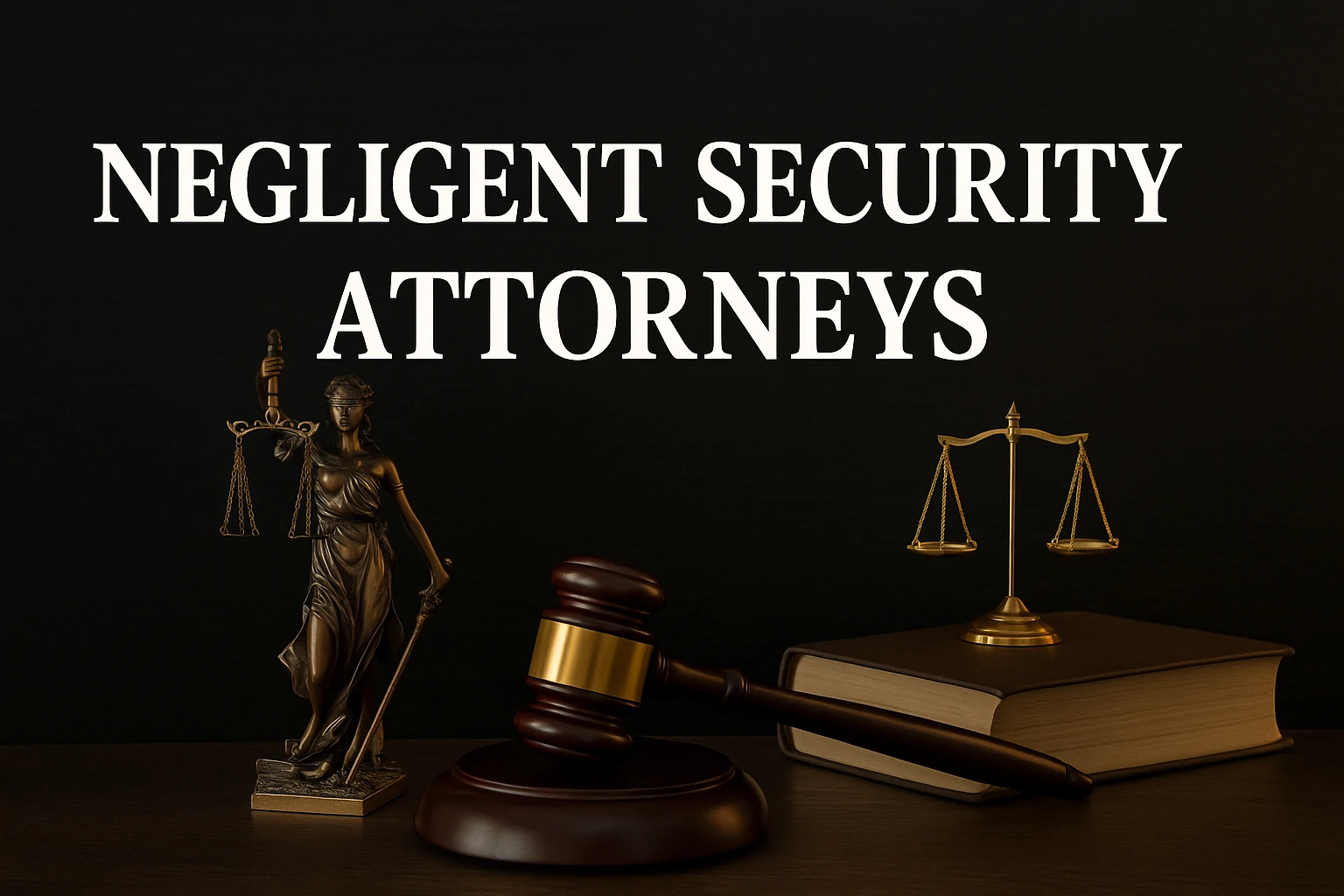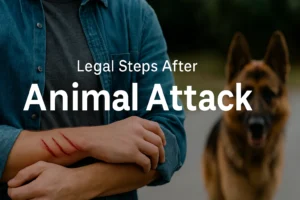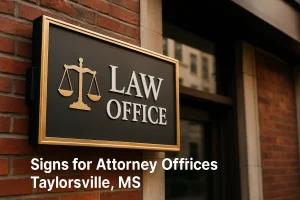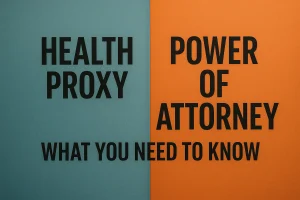Most people do not expect danger when they visit a business, hotel, apartment, or school. They assume someone took steps to keep them safe. When that safety fails, the results can change a life forever.
A crime may happen in a place that should have had working lights, locked doors, or trained security staff. Many people blame the criminal alone. But the law also looks at the property owner. If they failed to fix a known risk, they may be responsible.
Negligent security law helps victims in these cases. These laws hold property owners accountable. Victims can get money for medical care, lost wages, pain, and other losses. A negligent security attorney helps make that happen.
This guide explains what these attorneys do. It shows how they build cases, protect your rights, and help you recover after harm in an unsafe place. If someone failed to protect you, this may be the legal support you need.
What Is Negligent Security?
Negligent security happens when a property owner fails to protect guests or tenants from crime. This includes places like parking lots, hotels, stores, apartment buildings, or nightclubs. These cases involve crimes such as assault, robbery, or worse.
A property owner has a duty to provide a safe environment. If past crimes happened in the same place, the owner must act. They must fix broken locks, install lights, hire guards, or post warnings. If they do nothing, and someone gets hurt, they may be legally at fault.
Not all crimes count as negligent security. A random act with no warning signs may not lead to a case. But if a history of crime existed, or if others complained, and the owner ignored it, a case may move forward.
Types of Crimes That Lead to Negligent Security Claims
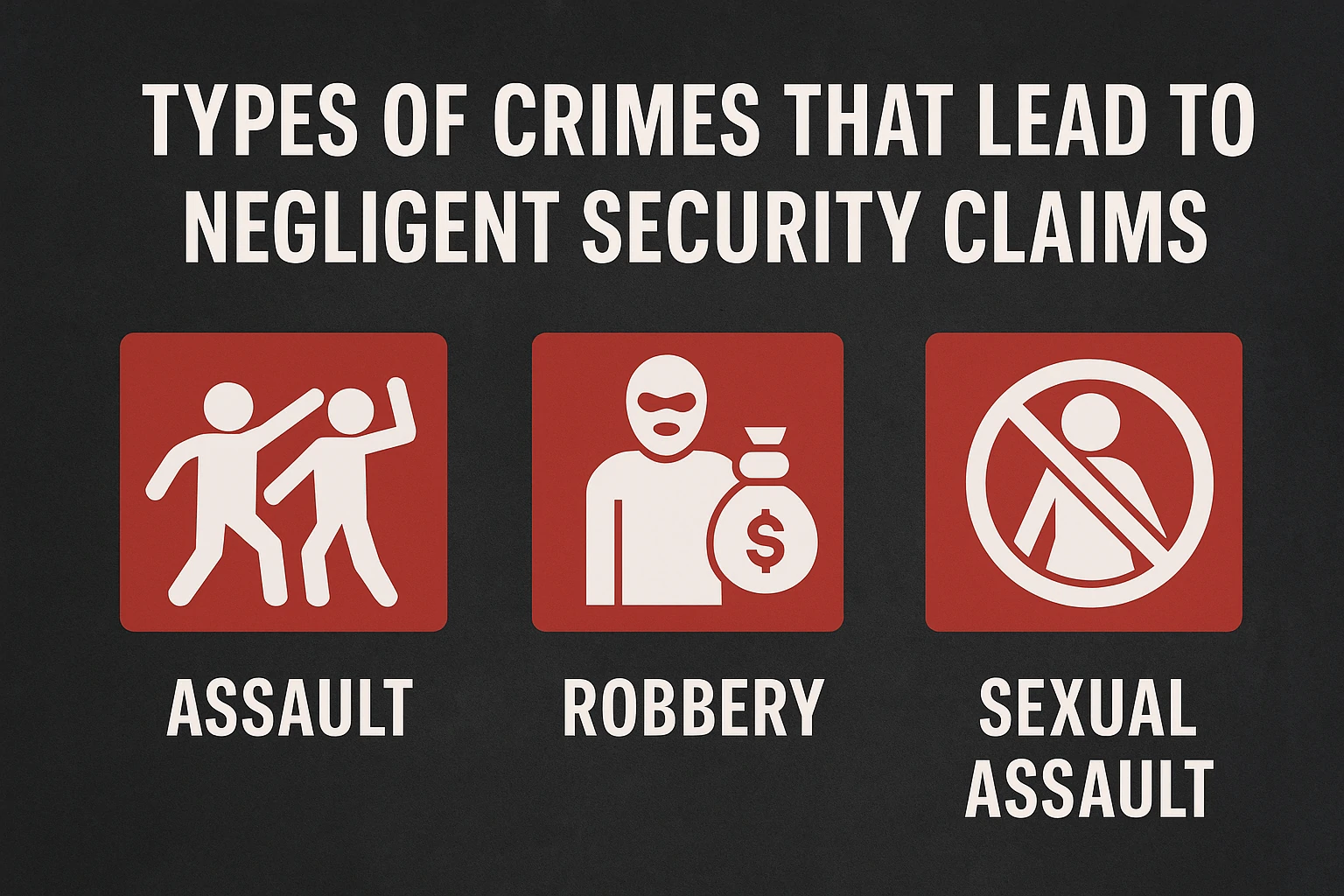
Crimes often happen in places where safety breaks down. Many of these crimes could have been stopped with simple action. That failure becomes the center of a negligent security case.
Assault is the most common crime in these cases. It may happen in a dark hallway, an unlocked building, or a parking lot with no lights. Robbery is another. Victims may lose money, phones, or even face harm during the theft.
Some victims face even worse crimes. Sexual assault and shootings can happen where no one is watching. Many of these places had past problems. The owner chose not to fix them. That choice puts others at risk. When that risk becomes real, the law allows victims to take action.
Negligent Security vs. Premises Liability: What’s the Difference?
| Feature | Negligent Security | Premises Liability |
|---|---|---|
| Focus | Crime due to poor security | Physical dangers like spills or broken stairs |
| Cause | Outside threats, like attacks or theft | Unsafe conditions, like cracks or leaks |
| Examples | Assault, robbery, sexual assault, shootings | Slip-and-fall, falling objects, exposed wires |
| Proof Needed | Show owner failed to stop known crime risks | Show owner failed to fix or warn about hazards |
| Main Question | Did the owner ignore danger from people? | Did the owner fail to fix a dangerous place? |
Both fall under the same legal area. Both deal with harm on someone else’s property. But negligent security deals with crime. It asks if a simple safety step could have saved someone from violence.
What Happens If You’re Attacked in a Building with No Security Cameras?
A camera can make the difference between justice and silence. When no video footage exists, proving a negligent security case becomes harder. But it does not make the case impossible. It only means the lawyer must take a stronger path to gather proof.
If a building has no cameras, the owner may still be at fault. The law asks one question: did the owner know about the risk and choose to do nothing? In some areas, having no cameras at all may count as a failure, especially if past crimes occurred at the same location.
Other details can help build the case. A witness may come forward. Maintenance records may show long delays in fixing broken locks or lights. Police reports may reveal a pattern of danger that the owner ignored. An experienced attorney will find these details and build a solid claim without needing camera footage.
Can You Sue an Apartment Complex for a Crime on the Property?
Yes, you can sue an apartment complex if a crime happens because of poor security. Tenants have a right to feel safe where they live. Owners must take steps to protect residents and their guests from harm. If they fail, the law may hold them responsible.
An apartment complex must fix broken locks, install lights, and respond to tenant complaints. If the gate stays open or cameras never work, the risk grows. When that risk turns into violence, the owner may be liable. The key is showing that the danger was known and preventable.
Many cases involve assaults in hallways, break-ins, or attacks in parking areas. A court may look at past crimes, tenant warnings, or security reports. If the owner knew about the danger and failed to act, a lawsuit may follow. A skilled attorney can guide tenants through this legal process and fight for the justice they deserve.
Negligent Security Laws by State: What Changes Based on Where You Live?
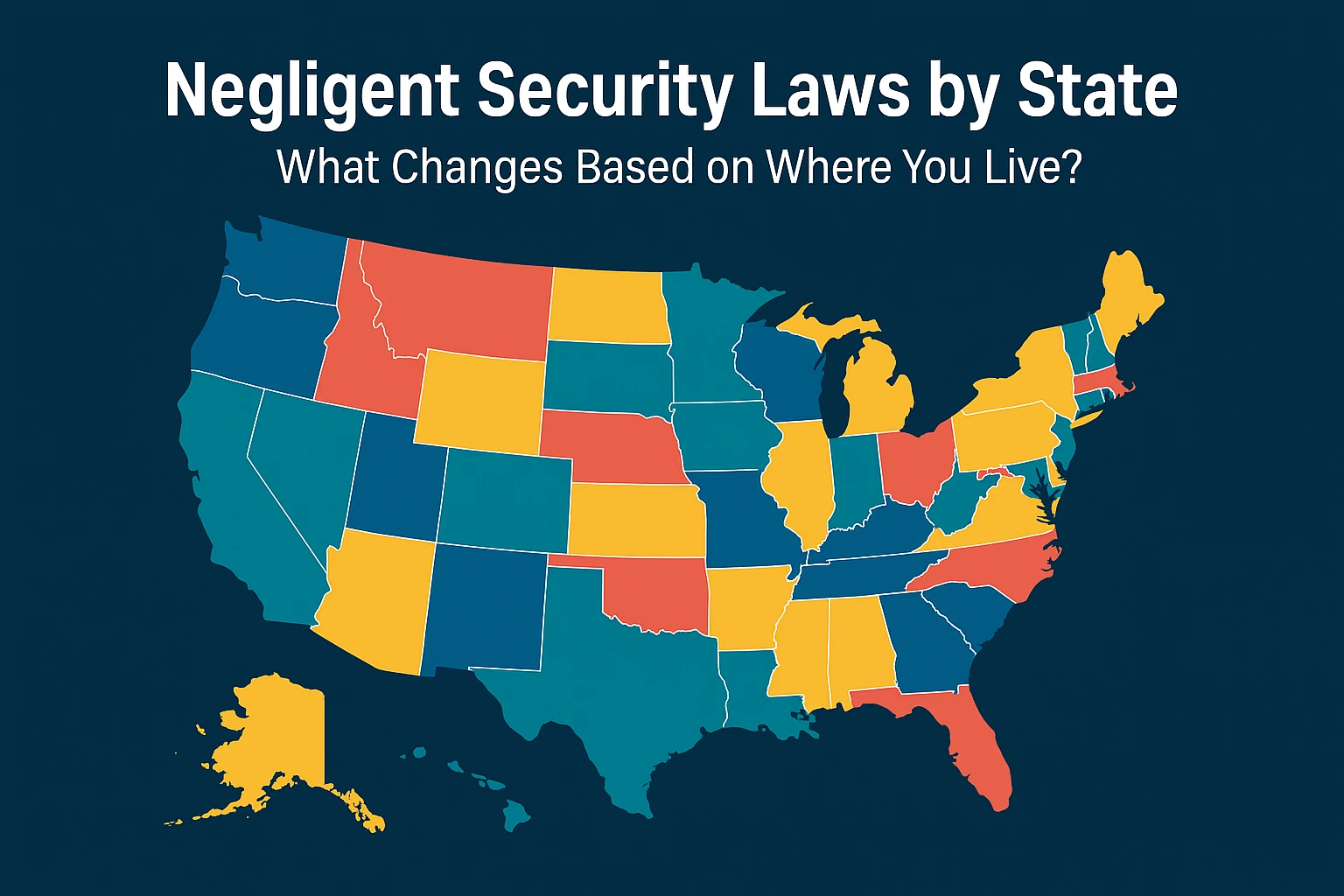
Negligent security laws do not stay the same in every state. Some states protect victims more than others. The rules may change based on local crime levels, court decisions, or how much proof the law requires.
In Florida, property owners must respond fast to known threats. Apartment buildings, hotels, and stores face strong legal pressure. Georgia also takes crime history seriously. If a location has seen repeated violence, owners must fix it or face a lawsuit. California laws require owners to act if the danger was foreseeable. That means they cannot ignore past complaints or crimes near the property.
Texas courts often focus on what the owner knew before the crime. Some states allow more time to file a case. Others demand action within a short period. Every location has its own limits, rules, and deadlines. That is why victims should speak with a local attorney. A lawyer who knows the state law can give clear answers and the best chance for success.
How Much Is a Negligent Security Case Worth?
No two negligent security cases have the same value. The amount depends on the harm done, the cost of recovery, and how strong the evidence looks. Some victims receive small amounts. Others get large settlements or verdicts. A case with deep injuries or emotional damage may lead to higher pay.
Medical bills come first. That includes emergency care, surgery, or therapy. If the injury leads to missed work, the lost income adds to the claim. Some victims cannot return to their jobs. Others suffer long-term pain or mental trauma. These losses count too.
Courts may also add extra money when the owner acted with clear neglect. That money serves as a warning to other property owners. An attorney can study the facts and give a rough idea of what a case may bring. The total depends on how much the crime changed the victim’s life.
What If the Crime Happened at Work?
Some people face danger at work. That danger may come from criminals, not co-workers. If a person suffers harm on the job due to poor security, they may have two paths. One leads through workers’ compensation. The other may lead to a negligent security claim.
If the employer knew about crime risks and failed to act, they may be held responsible. That includes businesses with no guards, cameras, or safety rules. If others were attacked before, the case becomes stronger. A lack of training, broken doors, or no staff presence can all support the claim.
Some cases involve third-party crime. This means someone from outside the company caused the harm. That does not protect the employer. If the property had clear risks, and the boss ignored them, legal action may follow. A lawyer can explain what fits under negligent security and what falls under job-related injury law.
Can You Sue If You Were a Guest, Not a Tenant or Customer?
Yes, you may have a case even if you were only a guest. The law protects more than just tenants or paying customers. If a property invites people in, it must also provide safety for visitors. That includes friends, delivery workers, and service providers.
Guests often trust the people who live or work in the building. They expect a safe place. If a guest suffers harm due to poor security, they may sue the owner or manager. Courts ask one main question: Did the owner know about the risk and ignore it?
Guests must prove that the danger was avoidable. That may include a broken lock, no lights, or past crimes in the area. A lawyer can help sort out the facts and explain the guest’s rights under negligent security law.
Wrongful Death from Negligent Security: What Families Need to Know
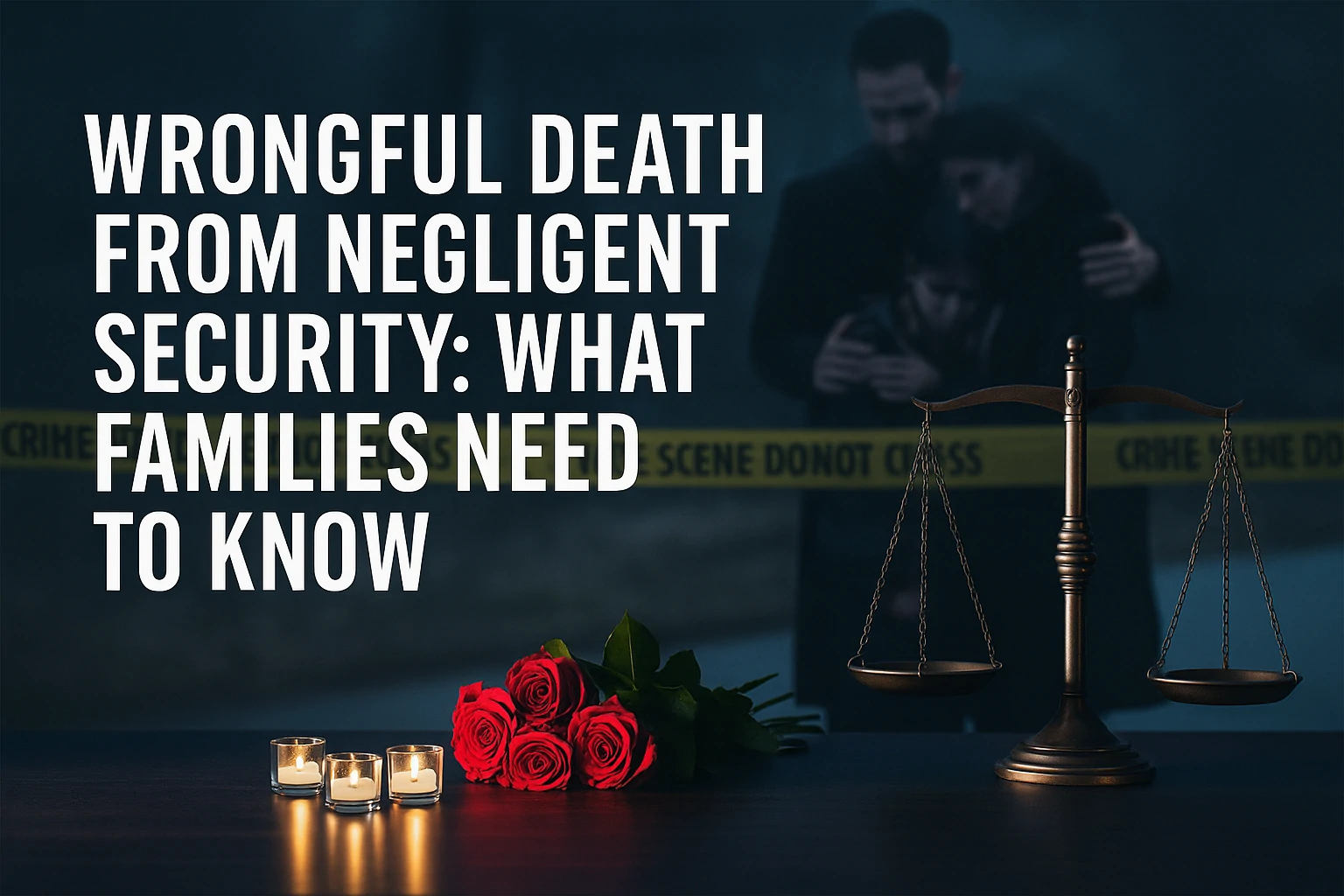
Some crimes end in death. Families often feel broken and lost. The pain cuts deep. When that death happens because a property owner failed to provide safety, the law may give the family a path to justice.
Wrongful death from negligent security means a person lost their life due to poor or missing safety measures. This could happen in a hotel, apartment, mall, or parking lot. If the owner knew about the danger but did nothing, they may face legal action.
A wrongful death lawsuit can help cover funeral costs, lost income, and emotional pain. It also gives the family a voice. It brings truth to light. A skilled attorney can handle the legal side so the family can focus on healing. The goal is not just money-it is justice, respect, and change.
How a Negligent Security Attorney Helps
A negligent security attorney helps victims who were harmed due to unsafe property. These lawyers understand how to build strong cases against owners, landlords, or managers who failed to take action.
They begin with a full review of what happened. They collect police reports, witness statements, medical records, and security footage. They visit the scene and look for proof of neglect. They ask what the owner knew and when they knew it.
The attorney then prepares a legal claim. This claim shows that the owner failed in their duty. The lawyer handles all communication with the other side. This includes insurance companies and defense attorneys.
In most cases, the lawyer will try to reach a fair settlement. If that fails, the case may go to court. A trial allows the victim to show what went wrong and seek fair compensation.
Where These Cases Happen Most
Negligent security claims can happen anywhere. But some locations carry higher risk than others. Apartment complexes often appear in these cases. Many owners fail to maintain secure entrances or respond to tenant concerns.
Hotels and motels may skip background checks or ignore safety upgrades. Visitors trust them for safe rooms, but crimes can happen when owners cut costs.
Parking lots also pose risks. Poor lighting, no cameras, and lack of staff presence all raise danger. Stores, bars, and nightclubs may invite large crowds without proper security. These places must do more to prevent injury.
Schools and colleges may also face claims. If they fail to respond to past reports of violence or harassment, they may be liable for future harm.
If you want to see how law offices protect their space, read this breakdown on signs for attorney offices in Vista, CA.
What a Victim Needs to Prove
To win a negligent security case, a victim must show clear facts. Each part connects the owner’s failure to the harm that happened. The proof must tell a full story of neglect and result.
A victim must prove:
- A dangerous condition existed on the property.
- The property owner knew or should have known about this danger.
- The owner failed to fix, warn, or act on the risk.
- The harm happened because of that failure.
Each point links to the next. A strong case shows that safety steps could have stopped the crime. A good attorney uses these facts to prove the crime was not chance, it was preventable.
What Damages Can Be Claimed
Victims of negligent security can ask for money to cover their losses. The law allows them to recover costs tied to the crime. These losses may be physical, emotional, or financial.
A victim may claim:
- Medical bills for emergency care, surgery, or hospital stays
- Therapy costs or long-term treatment for emotional harm
- Lost income from time away from work
- Future lost wages if they cannot return to the same job
- Pain and suffering caused by fear, trauma, or stress
- Moving costs if they must leave the unsafe property
- Funeral costs in wrongful death cases
- Extra money if the owner acted with serious neglect (punitive damages)
Each case is different. The final amount depends on how much the crime changed the victim’s life. A lawyer helps calculate and demand full and fair payment.
How Much Time You Have to File
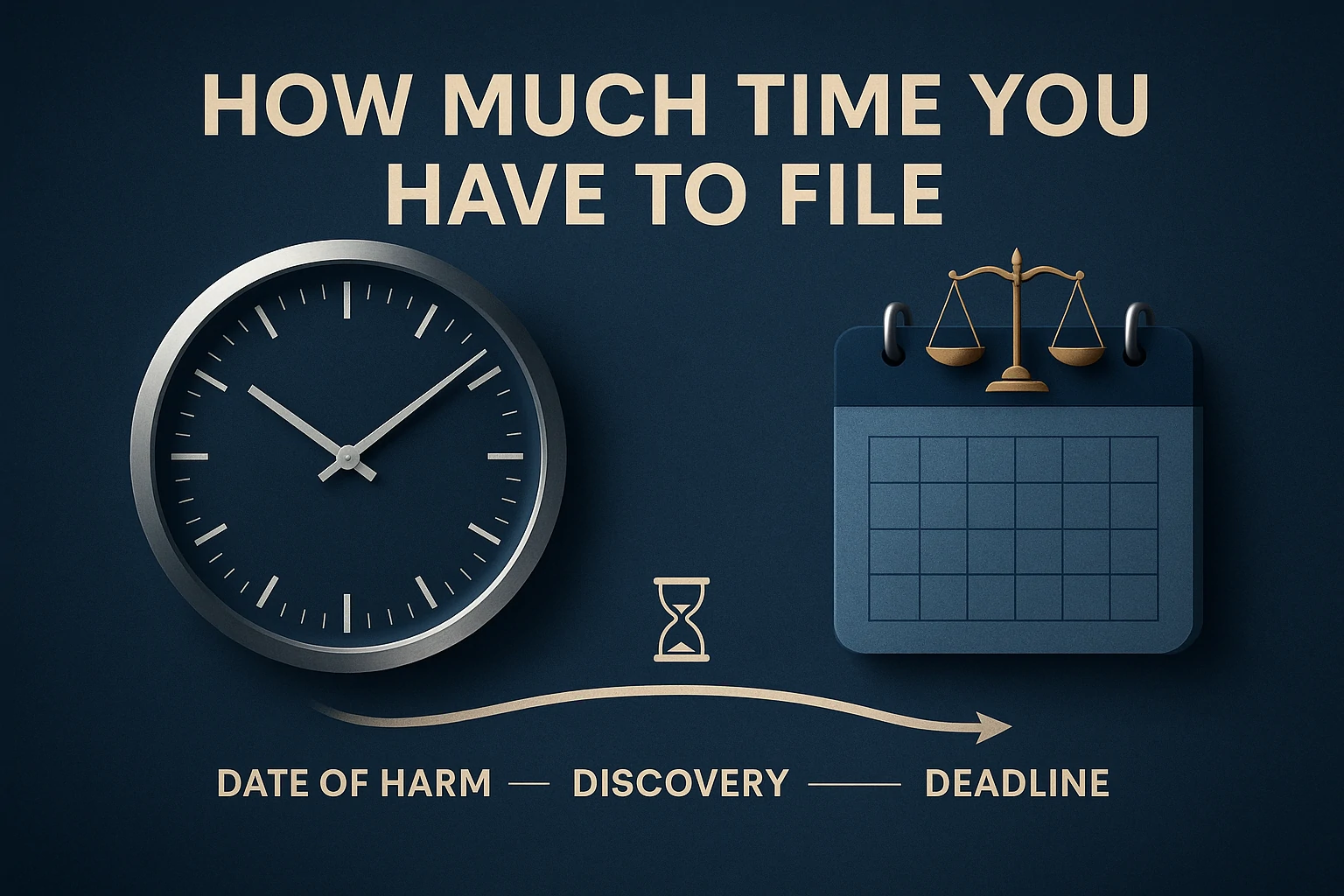
Every state has a limit on how long you can wait to file a negligent security case. This time limit is called the statute of limitations. It usually ranges from one to four years, depending on where the crime occurred.
Missing this deadline means you lose your right to sue. Even if your case is strong, the court will reject it. That is why it is important to speak to a lawyer as soon as possible.
The attorney can check the deadline for your case. They will make sure all papers are filed on time and that your claim stays valid.
How to Choose the Right Attorney
Not every injury lawyer handles negligent security cases. You need someone who knows this area of law and has worked with similar victims.
A good attorney will listen carefully. They will ask clear questions and explain your options. They will never rush you or make promises they cannot keep.
Look for someone who works on a “no win, no fee” basis. This is called a contingency fee. You pay nothing unless the attorney wins the case. The fee then comes from the settlement, not your pocket.
Check reviews, past case results, and their approach. Make sure they have handled security claims, not just car accidents or general injury work.
What to Expect After Filing
Once a negligent security claim is filed, the legal process begins. The property owner or their insurance company may respond with a defense. They may deny all blame or try to blame the victim.
Your lawyer will push back. They will respond to legal filings, answer questions, and demand records. This part of the case takes time.
In many cases, both sides will discuss a settlement. If a fair offer comes, you may agree to avoid trial. If no agreement happens, the case may go to court.
At trial, the judge or jury decides who was at fault and how much the victim should get. Your lawyer will present evidence and argue your case.
The process may last months or more. But a strong legal team keeps the case moving and keeps you informed.
What Makes a Case Strong
A strong case begins with proof. Past crimes on the property, broken safety systems, and ignored complaints all help. So does fast action after the crime. Waiting too long may hurt your claim.
A clear timeline helps. Your lawyer will build a story of what happened, what the owner knew, and how they failed to act. They will show how that failure led to your injuries.
The best cases show a pattern. If other people were harmed in the same way, or if records show clear warning signs, your case becomes stronger.
A helpful witness, a police report, or a maintenance log can make all the difference. Your attorney will know what to look for and how to use it.
If your case involves threats or violence, you may also need help from an attorney for a no contact order.
Final Thoughts
Negligent security does not start with violence. It starts with small failures. A broken lock. A dark hallway. A gate that stays open. These signs may seem minor, until someone gets hurt.
Victims of these crimes often carry deep pain. The injury affects their body, their peace of mind, and their trust in others. Many feel ignored or blamed. But the law does not forget them. It gives them a way to speak and to demand justice.
Property owners must take safety seriously. When they ignore known risks, they place people in harm’s way. That choice has a cost. The law holds them accountable. A strong legal case can bring answers, action, and support.
A negligent security attorney does more than file papers. They help people feel heard. They gather truth. They prove what went wrong. If you or someone you love suffered harm on unsafe property, do not wait. You have rights. A trusted attorney can help you use them.
This article provides general information about negligent security law. It does not offer legal advice. Laws may vary by state, and each case is different. Speak with a licensed attorney in your area to understand your legal rights.

